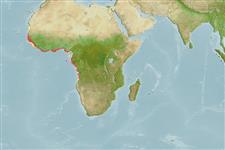Common names from other countries
>
Pleuronectiformes (Flatfishes) >
Cynoglossidae (Tonguefishes) > Cynoglossinae
Etymology: Cynoglossus: Greek, kyon = dog + Greek, odous = teeth + Greek, glossa = tongue (Ref. 45335).
More on author: Kaup.
Environment: milieu / climate zone / depth range / distribution range
Ecologia
marinhas; Água doce; estuarina demersal; intervalo de profundidade 10 - 110 m (Ref. 2683). Tropical; 22°N - 18°S, 18°W - 14°E
Eastern Atlantic: Mauritania to Angola (Ref. 81291, 81682).
Tamanho / Peso / Idade
Maturity: Lm ? range ? - ? cm
Max length : 66.5 cm TL macho/indeterminado; (Ref. 81682); common length : 25.0 cm TL macho/indeterminado; (Ref. 2683)
Espinhos dorsais (total): 0; Raios dorsais moles (total): 119-125; Espinhos anais 0; Raios anais moles: 93 - 99. Diagnosis: body flat and elongate; snout broadly rounded, its rostral hook rather short, extending to level of anterior nostril; angle of mouth extending backwards beyond level of lower eye (Ref. 81291). Eyes small and placed on left side of head and, unusual for cynoglossids, eyes well separated from each other, separated by wide interorbital space (Ref. 81291, 81682). Ctenoid scales on eyed side and cycloid scales on blind side; 12 caudal fin rays (Ref. 81291, 81682). 2, sometimes 3, lateral lines on eyed side and a single one on blind side (Ref. 81682). 89 (Ref. 81682) - 138 tubular (Ref. 81291) mid-lateral line scales. Generally 17-18, exceptionally 16 or 19, transversal scales between mid-lateral line and margino-dorsal lateral line (Ref. 81291, 81682).
Colouration: eyed side more or less uniformly brown, with greenish reflections in life; opercular region often blackish; blind side whitish (Ref. 81291, 81682). Sometimes black spot present at bases of posterior anal and dorsal fin rays; fins often spotted (Ref. 81682).
Found on sand and mud bottoms of coastal waters (Ref. 2683, 81682), including estuaries and fresh water lagoons (Ref. 81291). Feeds on (lamelibranch) mollusks, shrimps, crabs and fish (Ref. 28587, 81682). Sold as frozen filet under the name 'filets de sole' (Ref. 5377).
Life cycle and mating behavior
Maturidade | Reprodução | Desova | Ovos | Fecundidade | Larvas
Menon, A.G.K., 1977. A systematic monograph of the tongue soles of the genus Cynoglossus Hamilton-Buchanan (Pisces: Cynoglossidae). Smithson. Contrib. Zool. (238):1-129. (Ref. 5297)
Categoria na Lista Vermelha da IUCN (Ref. 130435)
CITES (Ref. 128078)
Not Evaluated
Ameaça para o homem
Harmless
Utilização humana
Pescarias: espécies comerciais
Mais informação
ReferênciasAquaculturaPerfil para aquaculturaEstirpesGenéticaElectrophoresesHereditariedadeDoençasProcessamentoMass conversion
Ferramentas
Relatórios especiais
Descarregue XML
Fontes da internet
Estimates based on models
Preferred temperature (Ref.
115969): 19.2 - 27.9, mean 25.7 (based on 88 cells).
Phylogenetic diversity index (Ref.
82804): PD
50 = 0.5000 [Uniqueness, from 0.5 = low to 2.0 = high].
Bayesian length-weight: a=0.00417 (0.00202 - 0.00858), b=3.08 (2.91 - 3.25), in cm Total Length, based on LWR estimates for this Genus-body shape (Ref.
93245).
Nível Trófico (Ref.
69278): 3.6 ±0.58 se; based on food items.
Resiliência (Ref.
120179): Baixo, tempo mínimo de duplicação da população 4,5 - 14 anos (K=0.10).
Fishing Vulnerability (Ref.
59153): High vulnerability (64 of 100).
